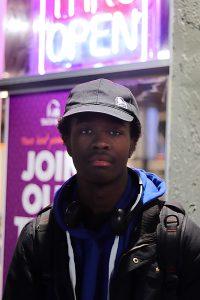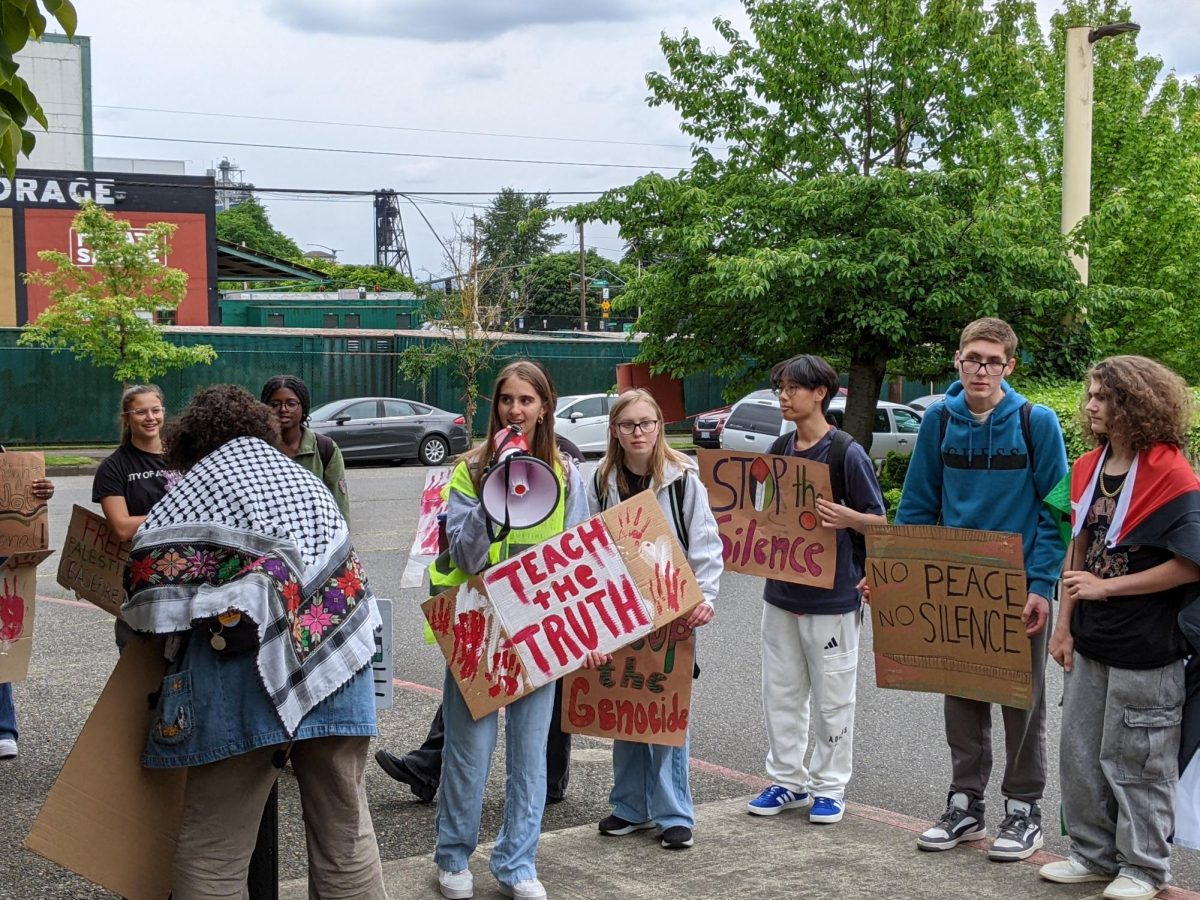The time is 10:54 p.m. The iconic purple bell illuminates the night sky as Turner Williams counts down the final minutes until he can clock out from his seven hour shift. Williams, a junior at Grant High School, works at Taco Bell, serving seven-layer burritos and taco supremes from five p.m.-11 p.m., five times a week.

After turning 16 — the legal age to get a job in Oregon — he applied to Subway and was hired on the spot. For Williams, a job was necessary to help pay bills and help support his family. But when his hours were cut to prioritize the adult workers, he was no longer making a stable income and was forced to quit and find a new job.
For many high schoolers, working may mean a summer job as a swim instructor at a local pool, or a part-time job as a barista or a tutor. Earning minimum wage is often an opportunity for students to start making their own income and become more independent.
For Jerred Smith, a junior at Grant, work has allowed him to do exactly that.
Smith works 10 to 15 hours a week at Mathnasium, a learning center that offers math tutoring services for youth. He works one-on-one with elementary school students and helps them build their overall understanding of math. Although work has given him independence, it is not necessary for him because he has sufficient financial support from his parents.
But for some students, a job is more than just an extra allowance; it allows them to pay for living expenses and monthly bills.
This is the case for Williams.
Williams works 25 to 30 hours a week at Taco Bell as a crew member. “It’s extremely exhausting,” he admits. “I almost fell asleep in math class during the test … working until midnight then having to wake up for school … it’s a lot.” he says.
But for Williams, a job was necessary to help pay bills and help support his family. “I first got a job to help my mom and dad with their bills,” he says. “But when my mom got a job they told me I didn’t have to help out as much. . . The money I make now is mostly for myself opposed to before when it was for family.”
Williams believes that working full-time as a high schooler will help better prepare him for his future and feels a sense of joy when helping his family. “Some people think of it (paying bills) as like oh I’m so sad, I have to give this money away but for me I actually felt happy doing that, I’d give money to my mom and I’d be like I’m helping out my mom after she’s been taking care of me for so long. . . it was a good feeling,” says Williams.
The current minimum wage in Oregon is $12.50. About one in 20 Oregon jobs pay minimum wage.
On July 1 of 2020, the minimum wage in Oregon will increase by 75 cents. In the spring of 2016, Oregon passed legislation to increase the minimum wage from $9.75 an hour to nearly $15 an hour (in the Portland metropolitan area) by 2022. After 2022, wage rates will adjust annually based on inflation. The minimum wage in Oregon is divided into three zones, and the wage varies based on the county. On July 1, 2019, the standard minimum wage in Oregon increased to $11.25, while in Portland, it increased to $12.50.
According to Oregon’s Center for Public Policy, minimum wage workers working full-time will make between $22,880 and $26,000, an annual income that is not enough for a family to afford a one bedroom apartment.
A report released by the nonpartisan group Oregon Actions calculated that the minimum wage would need to be at least $15.96 to meet basic living expenses in Oregon — which includes food, clothing and rent.
Although $15.96 would cover basic necessities, it wouldn’t cover health insurance. At fast-food restaurant McDonald’s, a full-time employee over the age of 18 can apply for health insurance. Most high schoolers, even those working full time, do not meet the requirements for health insurance because of their age. Debbie Vandemark, an Oregon McDonald’s worker who has worked in the fast-food industry for the past 30 years, will receive health insurance this year for the first time in nearly three years. “I worked at a McDonald’s in Tualatin up until a year ago and I didn’t really have access to health insurance there. My doctors (have) been on me to do a few tests … but I couldn’t do it because I didn’t have insurance. But now, I’ll have health insurance again,” says Vandemark. “Having health insurance again will get me back on track.”
For high school students, balancing work with school can be a challenge. It can be difficult to know which to prioritize, especially when work becomes a necessity.
But many high school students are limited to a minimum wage job. For Gusty Watkins and Annika Sturges, a minimum wage job has also allowed them to be self-reliant, but has also caused them stress, exhaustion and lack of motivation.
Gusty Watkins, Junior
They/them
Crew Member at McDonald’s
When the final bell rings at 3:30 p.m., while some students might get ready for sports or hang out with friends, Grant junior Gusty Watkins hurries out of class and makes their way to McDonald’s on Cesar E Chavez Blvd. They change into the grey crew member shirt, with the classic white ‘M’ logo, and take a deep breath. At four p.m., they clock in for their five hour shift. They take orders at the drive-thru from four p.m. to nine p.m.. “Having work after school, I dread it the whole day,” says Watkins.

Watkins, who first started to work at McDonald’s last summer after turning 16, works three times a week. Their shifts range between five to nine hours, and they earn $12.50 an hour. “Having a job means I have money for lunch, going out with my friends, going to the mall … it’s helping me be a much happier teenager.”
But work also has its disadvantages. “I’m tired all the time … I go to bed at nine p.m., and wake up at five a.m. because I’ve gotten used to the really early shifts,” says Watkins. They also feel that work has caused them to feel less motivated to do school work because they are exhausted from their long shift at work.
From a young age, Watkins’ grandmother, Linda Watkins, encouraged them to be self-reliant and independent. “That’s how I was raised … It started out by (Gusty) wanting an expensive phone, and then it was facing the fact that I didn’t want to pay for it. If they wanted it that bad, they could darn well earn it. We didn’t expect to make this a long term thing, but they were so good at it and liked the money coming in that they just stayed with it,” says Linda Watkins.

Prior to getting a job, Watkins received a weekly $10 allowance. When they turned 16, they wanted to start making their own money so as not to rely heavily on their grandmother for personal expenses. “I think, why not get a job as soon as you can? Start saving up for your future … working feels good … to earn something … It feels like growing up a little bit,” they say.
Watkins pays for their monthly phone bill and personal living expenses, which include food, makeup and clothes. Although they work at least 20 hours a week, Watkins finds that their paycheck is depleted by monthly expenses. “I think the minimum wage should be at least $14 or $15 because it’s (the current minimum wage) really not livable if you’re trying to make a living and being independent. I made $6000 last year but I have almost nothing to show for it because I’ve had so many expenses,” says Watkins.
But even with the increase, Watkins believes they would still work the same amount. The increase would allow them to put more money toward their savings account and their future. They also recognize the impact that raising the minimum wage would have on their coworkers, some of whom rely on their jobs for housing, healthcare and other monthly payments. “The current minimum wage requires a lot of my coworkers to work two jobs at least, so when they come to work they are dead on their feet and they sleep in their car during their breaks. If we had a higher minimum wage, it would benefit them for sure, but also me as a teenager,” says Watkins.
Although Watkins feels that working at McDonald’s has been physically draining, they believe it has played a significant role in them gaining independence. “It’s helped me establish very good manners when I need to have them, it’s been very beneficial in total,” they say.
Watkins plans to work at McDonald’s throughout high school. They hope to see the minimum wage increase to a more livable wage. “I see the effects that (minimum wage) has on my coworkers especially,” says Watkins. “I see them walking around with their eyes half shut and they keep a good face but it’s just not good for people, it’s just not enough … (It) definitely needs to go up.
Annika Sturges, Senior
She/her
Regal Lloyd Center & IMAX
On Christmas of 2019, while many high schoolers opened gifts and spent the day with their families, Grant senior Annika Sturges was at work, ripping tickets and directing moviegoers to their rooms. “Christmas is our busiest day of the year. I was working there on Christmas all day, I worked from 10 a.m. to eight p.m. Over break … when I work more, that’s when (exhaustion) really hits me,” she says.
Sturges first started to work at Regal Cinemas in December of 2018. She got a job to occupy her free time and make her own income.
For many high school students under the age of 18, it can be difficult to find jobs. Sturges remembers struggling to find places that would hire her. “I went off of what my parents’ first jobs were … My mom worked in fast food and she told me it was kind of gross … She said she didn’t recommend it … so I was like, what is available … especially now … most places only hire 18 year olds … (Regal Cinemas) was one of the only available jobs.”
For Sturges, a job means that she can be more self-reliant, but it has not been necessary for her to support herself. “My parents support me. I have that privilege of them having the money to support me,” she says.
On average, Sturges works five hour shifts, four times a week. She works late-night shifts, and often finds herself overwhelmed and stressed when she has to balance work with school. “Sometimes if I’m working at the box office, since it is an enclosed area I am allowed to bring my homework in there, so I can do my homework then, but if I’m not working at the box office, then I don’t really get a chance to do my homework that night,” says Sturges.
Although her job has been a positive experience, with both supportive and understanding coworkers, it has also taken a toll on her mental health. “(My coworkers) understand that I go to school … They understand it’s a lot. I’m not the only person whose work takes a toll on, it takes a toll on everyone and everyone understands that and respects that.”
Sturges believes that work has also prepared her for college. “I think my job has benefited me in a way that has given me a sense of how to be more independent … Definitely for college … it prepared me … (Work) has given me a way to take care of myself.”
Although the current minimum wage has been enough to support Sturges while she has her parents to lean on financially, she believes that it would not be enough once she started to live on her own. “(Minimum wage) is just not enough if I had to be self-sufficient … It’s not enough If I was living on my own,” she says.
But for now, Sturges enjoys working and making her own income. Although she had plans to work at the theater for the rest of the school year and the summer before college, the theater has since closed due to COVID-19.
While Sturges has struggled to find a balance between work and school, she feels that her job has benefited her, and has only had good experiences while working at the theater. “I enjoy it so much that I don’t want to quit. I wouldn’t quit even though it stresses me out because I enjoy going there and seeing people that I’m friends with.”








































